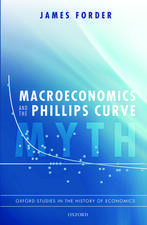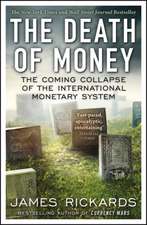Rethinking Economic Behaviour: How the Economy Really Works
Autor D. Simpsonen Limba Engleză Hardback – 29 sep 2000
| Toate formatele și edițiile | Preț | Express |
|---|---|---|
| Paperback (1) | 634.32 lei 6-8 săpt. | |
| Palgrave Macmillan UK – 2000 | 634.32 lei 6-8 săpt. | |
| Hardback (1) | 638.76 lei 6-8 săpt. | |
| Palgrave Macmillan UK – 29 sep 2000 | 638.76 lei 6-8 săpt. |
Preț: 638.76 lei
Preț vechi: 751.47 lei
-15% Nou
Puncte Express: 958
Preț estimativ în valută:
122.24€ • 126.28$ • 101.74£
122.24€ • 126.28$ • 101.74£
Carte tipărită la comandă
Livrare economică 26 martie-09 aprilie
Preluare comenzi: 021 569.72.76
Specificații
ISBN-13: 9780333779262
ISBN-10: 0333779266
Pagini: 248
Ilustrații: X, 234 p.
Dimensiuni: 127 x 203 x 20 mm
Greutate: 0.37 kg
Ediția:2000
Editura: Palgrave Macmillan UK
Colecția Palgrave Macmillan
Locul publicării:London, United Kingdom
ISBN-10: 0333779266
Pagini: 248
Ilustrații: X, 234 p.
Dimensiuni: 127 x 203 x 20 mm
Greutate: 0.37 kg
Ediția:2000
Editura: Palgrave Macmillan UK
Colecția Palgrave Macmillan
Locul publicării:London, United Kingdom
Cuprins
Preface Introduction The Economy as a Machine The Pretence of Knowledge Economics and Politics Economics and Business From Mechanical to Biological Analogies The Economy as a Human Complex Adaptive System The Co-ordination of Economic Activity The Evolution of Economic Institutions The Lessons of History Patterns in Economic Activity Adaptation in the Market Economy Implications for Economics Implications for Business and Government The Future of the Market Economy Conclusions Notes Inde
Recenzii
'Professor David Simpson has launched the most authoritative assult so far on mainstream economic thinking and the neoclassical equilibrium theory that underlies it.' - Lord David Howell, Daily Telegraph
'David Simpson has written a very important book. In his usual clear and incisive style he demolished the idea that economy is like a machine and he sets out a new paradigm. In place of the machine there is an evolving interactive system where entrepreneurship and institutions play central roles. His ideas are timely because his view of economics is consistent with the new information economy about which new-classical equilibrium analysis has little useful to say.' - Professor Colin Robinson, Editorial Director, Institute of Economic Afffairs
'a highly readable book...Simpson has had long experience of communicating with the business world.' - Samuel Brittan, Financial Times
'Simpson's work comes as something of a shock to those who believe economics to be about planning and regulation control based on the outpourings of computer forecasting models. As a counter to this warm delusion, his highly readable and provocative book is a necessary shock of iced water.' - Bill Jamieson, The Scotsman
'David Simpson has written a very important book. In his usual clear and incisive style he demolished the idea that economy is like a machine and he sets out a new paradigm. In place of the machine there is an evolving interactive system where entrepreneurship and institutions play central roles. His ideas are timely because his view of economics is consistent with the new information economy about which new-classical equilibrium analysis has little useful to say.' - Professor Colin Robinson, Editorial Director, Institute of Economic Afffairs
'a highly readable book...Simpson has had long experience of communicating with the business world.' - Samuel Brittan, Financial Times
'Simpson's work comes as something of a shock to those who believe economics to be about planning and regulation control based on the outpourings of computer forecasting models. As a counter to this warm delusion, his highly readable and provocative book is a necessary shock of iced water.' - Bill Jamieson, The Scotsman
Notă biografică
DAVID SIMPSON is Economic Adviser to the Standard Life Assurance Company, and is currently an Honorary Professor at Heriot-Watt University, a Trustee of the David Hume Institute, and a member of the Advisory Council of the Institute of Economic Affairs. He is the author of several books, including General Equilibrium Economics (1975), The Political Economy of Growth (1983), and The End of Macro-Economics (1994). He has also contributed articles to periodicals ranging from Econometrica and Scientific American to The Spectator and the Financial Times.





















